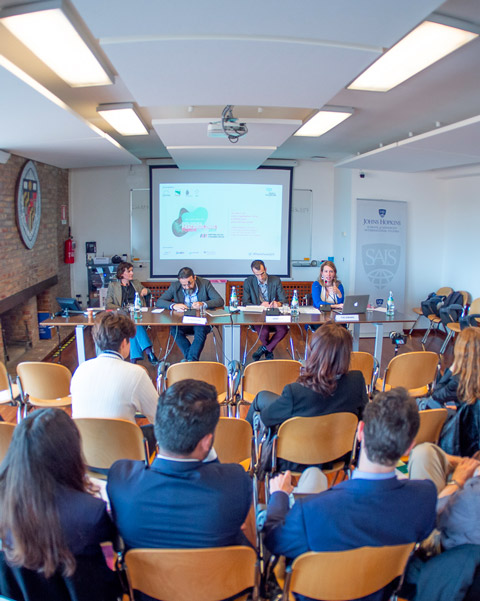
Concept
The Bologna Peacebuilding Forum (BPF) is a framework for dialogue and exchange between scholars and practitioners working on conflict resolution, peacebuilding and development.
After the 2019 edition in Bologna, at the Johns Hopkins School of Advanced International Studies, BPF 2020 takes place as a virtual event. The topic of the Forum will be “Peacebuilding after the pandemic. 2020-2030: Challenges and opportunities of the next decade”. The Forum intends to reflect on issues impacting the future of peace and conflicts, looking beyond the analysis of the current emergency.
The event is organized in 3 sessions. The first deals with the main crisis foretold of the next decade, exploring the relation between peacebuilding and climate change. Climate change can indirectly escalate the risk of conflict and peacebuilding has the capability to work on the linkages between environment, fragility and conflict. The second session will explore how human mobility can impact, both positively and negatively, peace processes. This topic has a clear connection with the previous session and represents one of the main challenges of the next decade. Speakers will reflect on the current restriction on mobility affecting the entire world, and its potential long-term impact on the phenomenon. Finally, the third session will feature an exchange on the future of peacebuilding after the pandemic exploring the possible outcomes of the current crisis with new unexpected emergencies but also with lessons to learn and with the introduction of new priorities in world’s political agendas.
The event will see the participation of young researchers, activists, and practitioners that answered to AP’s call for articles on the possible scenarios for the peacebuilding work in 2030. AP has decided to involve youth because there is a growing recognition that young people will be disproportionately affected by these future challenges if they are not already, and for this reason, they should be involved in processes to define and choose solutions. In December 2015, the UN Security Council (UNSC) adopted Resolution 2250, which recognized that young people should be engaged in decision-making at the local, national, regional, and international levels and outlined mechanisms that will enable meaningful youth participation in peace processes. As the examples of Malala Yousafzai and Greta Thunberg show, young people not only have the desire to be engaged but also have the capacity to shift debates within and across societies. These examples of young changemakers, and many more that have not yet made headlines show the need to give more young people the space to lead and make decisions. This means including young people at the table where decisions related to peace and security are made and valuing their voices as much as those of other actors.



